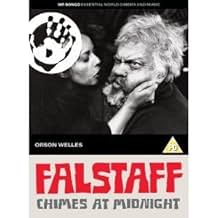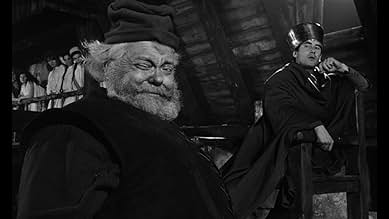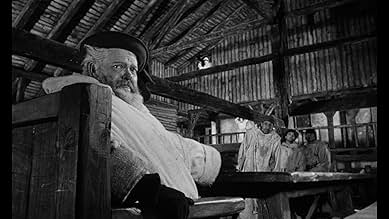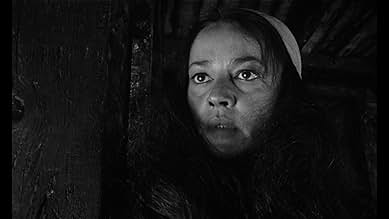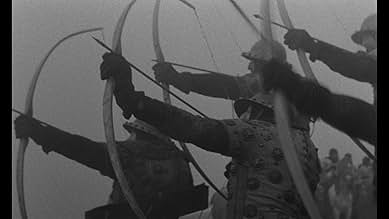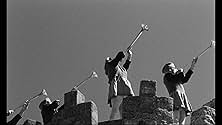IMDb रेटिंग
7.6/10
11 हज़ार
आपकी रेटिंग
अपनी भाषा में प्लॉट जोड़ेंWhen King Henry IV ascends to the throne, his heir, the Prince of Wales, is befriended by Sir John Falstaff, an old, overweight, fun-loving habitual liar. Through Falstaff's eyes we see the ... सभी पढ़ेंWhen King Henry IV ascends to the throne, his heir, the Prince of Wales, is befriended by Sir John Falstaff, an old, overweight, fun-loving habitual liar. Through Falstaff's eyes we see the reign of King Henry IV and the rise of Henry V.When King Henry IV ascends to the throne, his heir, the Prince of Wales, is befriended by Sir John Falstaff, an old, overweight, fun-loving habitual liar. Through Falstaff's eyes we see the reign of King Henry IV and the rise of Henry V.
- निर्देशक
- लेखक
- स्टार
- 1 BAFTA अवार्ड के लिए नामांकित
- 3 जीत और कुल 2 नामांकन
Michael Aldridge
- Pistol
- (as Michael Aldrich)
Andrés Mejuto
- Woman's Tailor
- (as Andres Mejuto)
José Nieto
- Northumberland
- (as Jose Nieto)
फ़ीचर्ड समीक्षाएं
(Flash Review)
Very rarely has a voice been so perfectly matched to the poetic genre of Shakespeare. His deep and rich voice bellows out lines with great authority and emotion. I have a strong dislike for Shakespeare as I've never been able to fully comprehend the dialog. But this was an Orson film so I gave it my time and was rewarded by well-composed shot framing and interesting camera angles as well as his distinctive voice. The plot was about the betrayal of friendship and revolves around kings and people ascending to power while some get left behind. Great acting, a meaty story and if you like both Shakespeare and Orson Welles, don't miss it.
Very rarely has a voice been so perfectly matched to the poetic genre of Shakespeare. His deep and rich voice bellows out lines with great authority and emotion. I have a strong dislike for Shakespeare as I've never been able to fully comprehend the dialog. But this was an Orson film so I gave it my time and was rewarded by well-composed shot framing and interesting camera angles as well as his distinctive voice. The plot was about the betrayal of friendship and revolves around kings and people ascending to power while some get left behind. Great acting, a meaty story and if you like both Shakespeare and Orson Welles, don't miss it.
This is all more of a fascinating and compelling film because of its difficult-to-find nature, and the feeling of its being neglected, despite much praise from film and Welles scholars. This forms part of the compelling sequence of Welles films that began with 1958's "Touch of Evil", and ran through to his final film, 1973's "F For Fake", a film I really want to see. The version I managed to locate of "Chimes..." revealed a film with, yes, some technical problems (the sound is a little poor, but I'd almost expected worse), and the feeling of being made on-the-hoof. But what a film it is! Certainly hitherto the finest and most moving Shakespeare film adaptation that I have seen; I was happy to be able to write on it for my recent University Tripos exam.
Welles is possibly not a perfect Falstaff - failing to some degree to capture the character's jovial humour - but he gives a good performance in a limited, but powerfully melancholy vein. Keith Baxter makes Hal very much his own, providing curious contrasts to both of his father figures. Gielgud is as sublime as ever, and his scenes are beautifully directed - one wouldn't know the problems Welles had in terms of actor availability, considering how effective the medium close camera-work is.
The poetry of the "Sleep" speech is absolutely overpowering in Gielgud's rendition, and his facial expressions, eyes cast in shadow, are perfectly haunting. The strength of his performance is crucial; Henry IV is thus very much a figure with dignity but guilt and a coldness matching the stone of his solitary court - brilliant use of some sort of cathedral. Margaret Rutherford and Tony Beckley certainly add a lot to the mix, as does the bizarrely ill-fitting Jeanne Moreau, that most French of actresses playing an English whore. The tenderness she feels for Falstaff is crucial in softening his character a bit; Moreau's bedraggled siren works as a necessary example of the femininity of the Tavern, as compared to the masculine world of battle and court that Falstaff is so lost in. What a striking actress she is here; piercing, soulful eyes, such lips and flowing dark hair. It is a skittish and perfect performance fitting in with Welles' fantasia of "Merrie England". That most of this was filmed in Spain conveys the sense of this as an artificial, beyond-reality dream of the Paradise Lost. The film can effectively be seen as Welles expressing his interest in Western society's mourning a lost golden age - in this case, "Merrie England", which Falstaff embodies. The rational and dulling technocracy of the future is suggested by the coldness of Gielgud and Baxter towards the end, and the atmosphere of court.
The actor playing Justice Shallow is supremely odd and bewitching in his shrill little voice; his blustering humour and reminiscence taking on much melancholy as the film moves inexorably towards its tragic, deathly close. The scene where Falstaff finds out Hal is now King, is wonderfully shown in long shot by a still camera; a depression and drift towards disillusion shown. When Falstaff finds out, the lift in spirits is conveyed with his movement towards the camera. It's a return to the general sense of camera mobility around Falstaff - contrasting with the stillness around Bolingbroke. The final rejection of Falstaff that follows is beautifully filmed by Welles, played ambiguously by Baxter and movingly by Welles.
What must be the most remarkable sequence is the Battle of Shrewsbury; it is this that will haunt the mind long into the ether... Savage, indiscriminate quickness of brutal death emphasised in quick cuts. The fighting is impersonal and grimly realistic; ranks of silhouetted men and horses charging in, arrows - unlike in Olivier's "Henry V" - being shown cascading into and piercing ranks of horses and soldiers. The dry ground dissolves gradually to mud, and a haunting, holy-sounding piece of choral music strikes a chilling note of ironic contrast. Mankind has been reduced by war back to the very mud from which it originally arose. All sense of 'glory' is dissipated and cut away, by this frightening, near-ten minute sequence. It is one of the most gripping, utterly transcendent and powerful sequences I have seen in the whole of my film viewing.
"Chimes at Midnight" is a marvel of a film; this is a Welles film in its true form and not tampered with - "The Magnificent Ambersons" is the most shameful previous example of this. "Chimes..." stands as a complex masterpiece; partly an elegy for an innocence than may never have truly existed, but which Welles *feels* deeply. Track this down if you can as it is something special; let's hope it is soon restored to the best possible condition. It is wonderfully slanted Shakespeare; history plays fashioned into a tragedy, and painted from the most compelling cinematic palette. And above all, it is wonderful Welles.
Welles is possibly not a perfect Falstaff - failing to some degree to capture the character's jovial humour - but he gives a good performance in a limited, but powerfully melancholy vein. Keith Baxter makes Hal very much his own, providing curious contrasts to both of his father figures. Gielgud is as sublime as ever, and his scenes are beautifully directed - one wouldn't know the problems Welles had in terms of actor availability, considering how effective the medium close camera-work is.
The poetry of the "Sleep" speech is absolutely overpowering in Gielgud's rendition, and his facial expressions, eyes cast in shadow, are perfectly haunting. The strength of his performance is crucial; Henry IV is thus very much a figure with dignity but guilt and a coldness matching the stone of his solitary court - brilliant use of some sort of cathedral. Margaret Rutherford and Tony Beckley certainly add a lot to the mix, as does the bizarrely ill-fitting Jeanne Moreau, that most French of actresses playing an English whore. The tenderness she feels for Falstaff is crucial in softening his character a bit; Moreau's bedraggled siren works as a necessary example of the femininity of the Tavern, as compared to the masculine world of battle and court that Falstaff is so lost in. What a striking actress she is here; piercing, soulful eyes, such lips and flowing dark hair. It is a skittish and perfect performance fitting in with Welles' fantasia of "Merrie England". That most of this was filmed in Spain conveys the sense of this as an artificial, beyond-reality dream of the Paradise Lost. The film can effectively be seen as Welles expressing his interest in Western society's mourning a lost golden age - in this case, "Merrie England", which Falstaff embodies. The rational and dulling technocracy of the future is suggested by the coldness of Gielgud and Baxter towards the end, and the atmosphere of court.
The actor playing Justice Shallow is supremely odd and bewitching in his shrill little voice; his blustering humour and reminiscence taking on much melancholy as the film moves inexorably towards its tragic, deathly close. The scene where Falstaff finds out Hal is now King, is wonderfully shown in long shot by a still camera; a depression and drift towards disillusion shown. When Falstaff finds out, the lift in spirits is conveyed with his movement towards the camera. It's a return to the general sense of camera mobility around Falstaff - contrasting with the stillness around Bolingbroke. The final rejection of Falstaff that follows is beautifully filmed by Welles, played ambiguously by Baxter and movingly by Welles.
What must be the most remarkable sequence is the Battle of Shrewsbury; it is this that will haunt the mind long into the ether... Savage, indiscriminate quickness of brutal death emphasised in quick cuts. The fighting is impersonal and grimly realistic; ranks of silhouetted men and horses charging in, arrows - unlike in Olivier's "Henry V" - being shown cascading into and piercing ranks of horses and soldiers. The dry ground dissolves gradually to mud, and a haunting, holy-sounding piece of choral music strikes a chilling note of ironic contrast. Mankind has been reduced by war back to the very mud from which it originally arose. All sense of 'glory' is dissipated and cut away, by this frightening, near-ten minute sequence. It is one of the most gripping, utterly transcendent and powerful sequences I have seen in the whole of my film viewing.
"Chimes at Midnight" is a marvel of a film; this is a Welles film in its true form and not tampered with - "The Magnificent Ambersons" is the most shameful previous example of this. "Chimes..." stands as a complex masterpiece; partly an elegy for an innocence than may never have truly existed, but which Welles *feels* deeply. Track this down if you can as it is something special; let's hope it is soon restored to the best possible condition. It is wonderfully slanted Shakespeare; history plays fashioned into a tragedy, and painted from the most compelling cinematic palette. And above all, it is wonderful Welles.
10ednlaura
This is one of the great Shakespearean adaptations and a true 'lost classic'. It's also the last masterpiece that Orson Welles directed in his lifetime, and with 'Citizen Kane,' 'Magnificent Ambersons' and 'Touch of Evil' comprises a quartet of major cinematic works that he accomplished.
The film is an inventive re-editing and condensation of Shakespeare's plays, spanning from the end of Richard II to the beginning of Henry V. The film focuses on the character of Jack Falstaff, played by Welles himself in a virtuoso performance. Falstaff's relationship with young Prince Hal (later Henry V) is explored, and uncannily parallels Welles' own experience with the young talents of Hollywood.
Chimes at Midnight can be a jarring experience due to inconsistent film quality, low budget sets and Welles' flair for shock cuts, but it's a truly rewarding experience once you adapt to the style and limitations.
There are several great performances, by John Gielgud as Henry IV, Keith Baxter as Hal and Norman Rodway as Hotspur, who seems like a predecessor to Kenneth Branagh.
Chimes at Midnight has a little of everything: low comedy, highly artistic camera angles, exciting battle scenes (the battle of Shrewesbury scene influenced Braveheart) and a deeply moving story that Welles has 'discovered' between the lines of Shakespeare's histories.
The film is an inventive re-editing and condensation of Shakespeare's plays, spanning from the end of Richard II to the beginning of Henry V. The film focuses on the character of Jack Falstaff, played by Welles himself in a virtuoso performance. Falstaff's relationship with young Prince Hal (later Henry V) is explored, and uncannily parallels Welles' own experience with the young talents of Hollywood.
Chimes at Midnight can be a jarring experience due to inconsistent film quality, low budget sets and Welles' flair for shock cuts, but it's a truly rewarding experience once you adapt to the style and limitations.
There are several great performances, by John Gielgud as Henry IV, Keith Baxter as Hal and Norman Rodway as Hotspur, who seems like a predecessor to Kenneth Branagh.
Chimes at Midnight has a little of everything: low comedy, highly artistic camera angles, exciting battle scenes (the battle of Shrewesbury scene influenced Braveheart) and a deeply moving story that Welles has 'discovered' between the lines of Shakespeare's histories.
By far the best of Welle's three Shakespearean adaptations this is also arguably THE best Shakespeare on screen. Most filmmakers go for the tragedies - vide Welles himself - or settle for Romeo and Juliet but the History plays are seldom tackled. Here the maestro dips into several texts - most heavily into the two parts of Henry 1V but also Merry Wives, Henry V, Richard 11 - and then welds them together seamlessly to give an in-depth portrait of Falstaff. With a nice touch of irony the narration is spoken by Ralph Richardson who, prior to Welles here, was the definitive Falstaff - and remains so as far as theatre is concerned. It's hard to fault so I won't try, merely revel in a touch of greatness. 10/10
The career of Shakespeare's Sir John Falstaff (Orson Welles) as roistering companion to young Prince Hal (Keith Baxter), circa 1400-1413.
Who can say bad things about Orson Welles? His work was often neglected in his lifetime, both by audiences and critics. Looking back now, I wonder how they could have missed the genius of "Citizen Kane". But yet, they did for many years.
This film is considered to be Welles' favorite of his own (I am unsure of the source for this claim) and has been influential. Yet, it is hard to get a decent copy (the one I have was a Portuguese import). There was no actor with such a presence as Welles, so Shakespeare is natural for him. He has successfully brought the stage to screen.
Who can say bad things about Orson Welles? His work was often neglected in his lifetime, both by audiences and critics. Looking back now, I wonder how they could have missed the genius of "Citizen Kane". But yet, they did for many years.
This film is considered to be Welles' favorite of his own (I am unsure of the source for this claim) and has been influential. Yet, it is hard to get a decent copy (the one I have was a Portuguese import). There was no actor with such a presence as Welles, so Shakespeare is natural for him. He has successfully brought the stage to screen.
क्या आपको पता है
- ट्रिवियाDespite portraying Falstaff as a grossly obese man, Orson Welles actually had to diet to slim down for the role.
- गूफ़The corpse of Hotspur opens and closes his mouth several minutes after his death.
- कनेक्शनFeatured in The 43rd Annual Academy Awards (1971)
टॉप पसंद
रेटिंग देने के लिए साइन-इन करें और वैयक्तिकृत सुझावों के लिए वॉचलिस्ट करें
- How long is Chimes at Midnight?Alexa द्वारा संचालित
विवरण
- रिलीज़ की तारीख़
- कंट्री ऑफ़ ओरिजिन
- भाषा
- इस रूप में भी जाना जाता है
- Chimes at Midnight
- फ़िल्माने की जगहें
- Calatañazor, Soria, Castilla y León, स्पेन(London streets scenes)
- उत्पादन कंपनियां
- IMDbPro पर और कंपनी क्रेडिट देखें
बॉक्स ऑफ़िस
- बजट
- $8,00,000(अनुमानित)
- US और कनाडा में सकल
- $1,26,724
- US और कनाडा में पहले सप्ताह में कुल कमाई
- $13,630
- 3 जन॰ 2016
- दुनिया भर में सकल
- $1,26,724
- चलने की अवधि1 घंटा 59 मिनट
- रंग
- ध्वनि मिश्रण
- पक्ष अनुपात
- 1.66 : 1
इस पेज में योगदान दें
किसी बदलाव का सुझाव दें या अनुपलब्ध कॉन्टेंट जोड़ें




